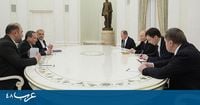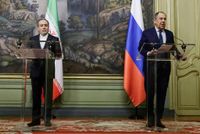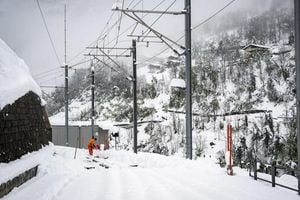On April 18, 2025, Russian Foreign Minister Sergey Lavrov made headlines by announcing that Moscow is prepared to assist in the ongoing negotiations between the United States and Iran regarding Tehran's nuclear program. During a joint press conference with Iranian Foreign Minister Abbas Araqchi in Moscow, Lavrov expressed Russia's readiness to support any agreements that might be reached concerning the Iranian nuclear file.
Lavrov emphasized that Russia welcomes the willingness of both Washington and Tehran to engage in discussions aimed at reaching a nuclear agreement. He stated, "Moscow is ready to assist in the indirect negotiations between the United States and Iran," underlining the importance of a potential agreement between the two nations. Furthermore, he noted that Russia is eager to play a role in any forthcoming deal, highlighting the necessity of keeping the talks focused solely on the nuclear issue.
In his remarks, Lavrov warned against introducing unrelated issues into the negotiations, stating, "Bringing external issues into the negotiation process creates a dangerous situation." His comments came as the U.S. and Iran prepared for further discussions, with the first round of talks having taken place in Oman, which both parties described as positive and constructive.
Iran has consistently maintained that its nuclear program is intended for peaceful purposes, including electricity generation, while the U.S. and its allies, including Israel, have accused Tehran of seeking to develop nuclear weapons. This ongoing tension has made the negotiations particularly critical, with both sides recognizing the potential for diplomatic resolution.
During the same press conference, Araqchi praised the strengthening of ties between Iran and Russia, calling their relationship "on the right track." He noted that his meeting with Russian President Vladimir Putin had been productive, and emphasized that Moscow plays a pivotal role in the international arena regarding the nuclear discussions.
Araqchi conveyed a message from Iranian Supreme Leader Ayatollah Ali Khamenei to Putin, discussing regional and international issues. He expressed optimism about the partnership agreement between Iran and Russia, which is expected to enhance cooperation between the two countries. The Iranian minister also mentioned that the Iranian parliament is likely to approve this partnership agreement soon.
As the negotiations progress, Araqchi stated that Iran is prepared to accept some limitations on uranium enrichment, provided that the U.S. offers strong guarantees that it will not withdraw from the nuclear agreement again. This reflects Tehran's cautious approach to the talks, as it seeks to ensure that any commitments made by Washington are reliable.
In a related context, Lavrov reiterated Russia's commitment to international law and the United Nations Charter, emphasizing the need to respect the lifting of what he termed "unlawful sanctions" against Iran. This statement aligns with Russia's broader geopolitical interests in supporting Iran against U.S. sanctions and maintaining its influence in the region.
The backdrop of these negotiations is a complex web of international relations, where the stakes are high for all parties involved. The U.S. has been clear about its stance, with President Donald Trump previously threatening military action against Iran if it does not agree to terms regarding its nuclear program. Trump has publicly stated, "I want to prevent Iran from having a nuclear weapon, and I want Iran to be great and prosperous."
As the dialogue unfolds, the potential for a nuclear agreement remains uncertain. Araqchi's comments reflect a cautious optimism, noting that if the U.S. demonstrates serious intentions and refrains from unrealistic demands, reaching agreements could be feasible. He pointed out that the U.S. had shown some seriousness during the initial talks held in Oman.
The next round of negotiations is scheduled to take place in Rome, where both sides will have the opportunity to further explore the terms of a potential agreement. As the situation develops, the involvement of Russia as a mediator could prove crucial in navigating the complexities of U.S.-Iran relations.
The international community continues to watch closely, with many hoping for a diplomatic resolution that could ease tensions in the region and pave the way for a more stable future. The interplay of diplomacy, international law, and national interests will undoubtedly shape the outcome of these critical negotiations.
In summary, the Russian offer to mediate in the U.S.-Iran nuclear discussions highlights the intricate dynamics at play in international diplomacy. With both sides expressing a willingness to engage, the coming weeks could be pivotal in determining the future of Iran's nuclear program and the broader geopolitical landscape.





